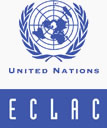According to a report by the UN Economic Commission for Latin America and the Caribbean (ECLAC), indigenous peoples in Latin America have seen improvement in terms of their access to health care and education, political participation and recognition of territorial rights.
However, significant gaps still exist, according to 'Guaranteeing Indigenous People's Rights in Latin America: Progress in the Past Decade and Remaining Challenges,' launched during the World Conference on Indigenous Peoples (WCIP), taking place from 22-23 September 2014, at UN headquarters in New York, US.
 22 September 2014: According to a report by the UN Economic Commission for Latin America and the Caribbean (ECLAC), indigenous peoples in Latin America have seen improvement in terms of their access to health care and education, political participation and recognition of territorial rights. However, significant gaps still exist, according to ‘Guaranteeing Indigenous People’s Rights in Latin America: Progress in the Past Decade and Remaining Challenges,’ launched during the World Conference on Indigenous Peoples (WCIP), taking place from 22-23 September 2014, at UN headquarters in New York, US.
22 September 2014: According to a report by the UN Economic Commission for Latin America and the Caribbean (ECLAC), indigenous peoples in Latin America have seen improvement in terms of their access to health care and education, political participation and recognition of territorial rights. However, significant gaps still exist, according to ‘Guaranteeing Indigenous People’s Rights in Latin America: Progress in the Past Decade and Remaining Challenges,’ launched during the World Conference on Indigenous Peoples (WCIP), taking place from 22-23 September 2014, at UN headquarters in New York, US.
The summary document, presented as a contribution to WCIP debates, analyzes available information on indigenous peoples in Latin America in relation to their sociopolitical context, demographics, territorial rights, and rights to health and education, and information and communication. It encourages the region’s countries to strengthen mechanisms for the protection of indigenous peoples implemented by the UN system, and recognize indigenous peoples’ contribution to building a new development paradigm based on equality and sustainability.
In addition to presenting updated data on relevant indicators, the report analyzes progress and remaining challenges relating to political participation and recognition of the collective rights of indigenous peoples. It highlights that the 45 million indigenous people living in Latin America constitute 8.3% of the region’s population. While important progress has been made in the areas of health care and education, for example, important gaps remain in the secondary school finishing rates and access to higher education compared to the non-indigenous population. Progress is also registered in territorial rights, including in the right to collective property ownership but, in terms of political participation, indigenous groups are still scarcely represented in state bodies.
Speaking at the launch of the report, Alicia Bárcena, ECLAC Executive Secretary highlighted the importance of recognition of land and territory, political participation, and the need for governance of natural resources, including consultation and sharing of benefits with indigenous peoples. [ECLAC Launch Alert Press Release] [ECLAC Publication Press Release] [ECLAC Publication Webpage] [Publication: Guaranteeing Indigenous People’s Rights in Latin America: Progress in the Past Decade and Remaining Challenges. Summary] [ECLAC Infographic on Indigenous Peoples in Latin America] [World Conference on Indigenous Peoples Website]